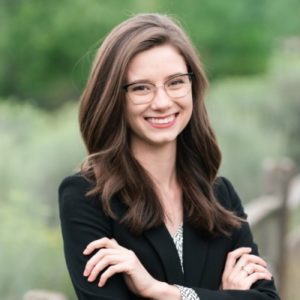
Kaia Likins graduated from Colorado State University in 2018 as a nutrition and food science major. She is currently pursuing her doctorate in Osteopathic Medicine at Touro University Nevada in the Las Vegas metropolitan area. In her free time, Likins enjoys cooking, going hiking with her husband, and caring for her many houseplants.
Describe your current position and degree program and some of the responsibilities that come with it.
I am a first-year student of Osteopathic Medicine at Touro University Nevada. As a medical student, most of my time is spent either studying or in the lab. The first two years of medical school are mostly didactic in nature, meaning most of the courses consist of lectures and textbook learning, not instruction in a clinical setting involving real patients. Clinical rotations are reserved for the last two years of medical school. At my school, teaching is grouped in short blocks, each focused on a different organ system; I have an exam on each block every two to three weeks. Running throughout the year are clinical skills assessments involving fake patient encounters and osteopathic manipulative medicine classes.
How has COVID-19 changed operations for your industry, and how are you responding to it?
Like most universities and institutions, TUN has had to transition to operating mostly in an online environment. Currently, all of my lectures are online – some are live; some are recorded. Our exams and lectures are remotely proctored, meaning that I am able to take my exams from the comfort of home. My lab sessions, including anatomy lab and OMM classes, have been held in-person on campus as it would be very difficult to teach such practical subjects online – I have heard that some medicine schools have replaced anatomy lab with a completely virtual learning experience. As students, we have also had opportunities to volunteer in administering the Covid-19 vaccine in the community. Our school has hosted drive-through vaccination stations on campus and at other locations in the local community. While this year has been tough for all of us, it has been rewarding and fulfilling to see both faculty and my fellow students adapt under the pressure of the pandemic.
Why did you decide to pursue your current career path?
I have known since I was very young that I wanted to pursue a career in healthcare because of my own experiences in the healthcare system and because of my love of science. As a doctor, I will be able to serve the community while working in a discipline that I find intellectually stimulating and challenging. While shadowing in the ER after high school, I realized that being a physician was the profession I wanted to pursue. I applied to mostly DO medical schools in contrast to MD schools because I believe that the more holistic view of patient care of DO programs will benefit my future patients. I am hoping to work as a primary care physician once I have completed my residency after medical school.
How have your education and experiences at CSU helped you in your career? Was there a faculty member in the College of Health and Human Sciences who inspired you most?
Choosing a pre-med major can be difficult. My best advice is to choose something that you are really passionate about – for me, that was Food Science and Human Nutrition. Instructor Coleen Burke’s classes inspired me to want to learn as much as possible about the relationships between nutrition and overall health. I am a supporter of preventive medicine over curative medicine – preventive medicine begins with nutrition. I think the perspective I developed while completing the course will be beneficial to my future patients. I felt that my time at CSU really prepared me for medical school because my nutrition classes were so engaging and applicable to medicine.
What advice do you have for students looking to join your field?
Don’t get discouraged! Getting into medical school can seem like a daunting task, but if you stick with it, your hard work will pay off. Don’t be afraid to take a gap year or two! I gained some valuable clinical experiences during my gap years, including shadowing an endocrinologist in Denver – I certainly wouldn’t trade those experiences for anything else. Also, I would suggest pursuing opportunities related to medicine that you are genuinely passionate about – that will help you avoid burn-out and will give you better experiences to talk about in your medical school interviews. Medicine has been challenging and rewarding so far. I think that provided both your passion for medicine and your commitment to work hard are present, you will be able to cope with medical school!
The Department of Food Science and Human Nutrition is a part of CSU’s College of Health and Human Sciences.